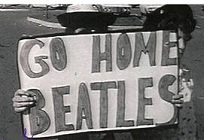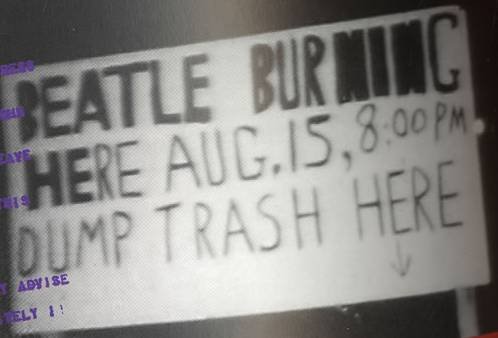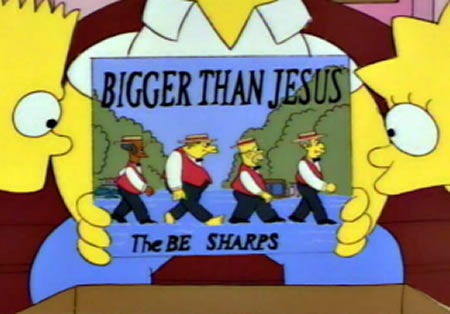
John Lennon made the statement in 1966 that the Beatles are more popular than Jesus. At the time, this was a true statement for many young people in America, England and across the world. However, the backlash against the Beatles brought anti-Beatles protests, boycotts, and culminated in death threats against Lennon and the Beatles. There's no question that Lennon had the right to make his statements about the Beatles and Jesus. There's no question that protesters had the right to disagree or not buy Beatles records. But when does the free expression of ideas and opinions go too far?
To say that the Beatles changed the world is a statement that can't be argued with. The onset of the fab four, first in England then in the United States and the rest of the world changed forever the music we listen to. Some would say they changed every aspect of life. After the Beatles touched down in Kennedy Airport on February 7, 1964 and played two appearances on the Ed Sullivan show, the Beatles overnight became the dominant figure in pop culture. They dominated the charts. On April 5, Billboard's top five songs were
Can't Buy Me Love
Twist and Shout
She Loves You
I Want To Hold Your Hand
Please, Please Me
It wasn't just Beatles music on every radio and every record player that made up Beatlemania. Boys had to have the mop haircuts to look like the Beatles, and every young girl seemed to have a crush on one or more of the boys in the band. The boys took their fame in stride and continued to churn out new music, play concerts all over the world, and make feature films.
I was all of 6 years old when the Beatles phenomenon was going on. I heard the music on the radio but had no idea what the impact really was. I had no idea how much the Beatles were shaking up the establishment and making it uncomfortable. The late 50's and early 60's were a time of Father Knows Best and Leave It To Beaver. Clean cut family values were the order of the day. Dad worked at the same company for years, while Mom stayed home with the kids and everyone went to church on Sunday. Rock and roll had already shaken up things in the 50s with Elvis, and before the Beatles the music industry had gone through a period of promoting acts to bring back the clean cut image and tame Rock and Roll.
It's fair to say when the Beatles took the music scene by storm it made a lot people uncomfortable. The clean cut idyllic life so many were accustomed to was being challenged. Conservatives and religious leaders no longer had the ear of their followers who were swept up in the Beatles' frenzy. The Beatles were seen as free spirit young people who could break all the rules and everyone loved them. It only got worse for the conservative establishment when stories came out about the Beatles experiments with drugs. While one generation couldn't get enough of the Beatles, the older generation was looking for a way to bring them down.
The opportunity came in 1966. John Lennon, always the most outspoken Beatle, did an interview with Maureen Cleave of the London Evening Standard. As part of his discussion of religion in current day affairs, he was quoted:
Christianity will go. It will vanish and shrink. I needn't argue about that; I'm right and I will be proved right. We're more popular than Jesus now; I don't know which will go first-rock 'n' roll or Christianity. Jesus was all right but his disciples were thick and ordinary. It's them twisting it that ruins it for me.
The interview was published in England and had really no impact. People in England read the interview and thought it was just John being John. Who could argue with the statement that the Beatles were more popular than Jesus. They were. This was a non-event. The Beatles continued making music, movies, and touring to an adoring generation.
It was only months later in August of 1966 when the quote was picked up in the United States that the backlash was unleashed. John Lennon said the Beatles were more popular than Jesus. He's gone too far. Somehow it spread all across the south where religious leaders in combination with radio stations whipped up a great Beatle boycott. They stopped playing their records and set up stations where people could bring Beatles records to be destroyed. People listened and followed the Beatle boycott like flocks of sheep. The Beatles received death threats. They nearly had to cancel some concert appearances in the south.
In a famous explanation, apology/non apology, Lennon tried to respond.
I made these statements in reference to England, that we meant more to kids than Jesus did, or religion, at that time. I wasn't knocking it or putting it down. I was just saying it.
I'm not saying we're better, or greater, or comparing us with Jesus Christ as a person or God as a thing or whatever it is. I just said what I said and it was wrong, or was taken wrong, and now it's all this -
The Beatles stature and place in pop culture was thrown off by the controversy. They stopped touring and gave far fewer interviews. Eventually their popularity returned as the quality of their work was so great. John Lennon overcame all the criticism and gave us many more classics, like Revolution, Imagine, and Give Peace a Chance before his life was cut short by a crazy gunman Mark David Chapman in 1980. It's not clear whether Chapman's murder of Lennon was set off by Lennon's views on religion or Chapman's obsession with Holden Caulfield from "The Catcher In The Rye".
I always wondered how related the Jesus controversy was to his lyrics in the Ballad of John and Yoko
Christ you know it ain't easy
You know how hard it can be
The way things are going
They're gonna crucify me










ALOJAMIENTO WEB
Is there a difference between having compassion for the world and having an individual moral compass for ones own life?